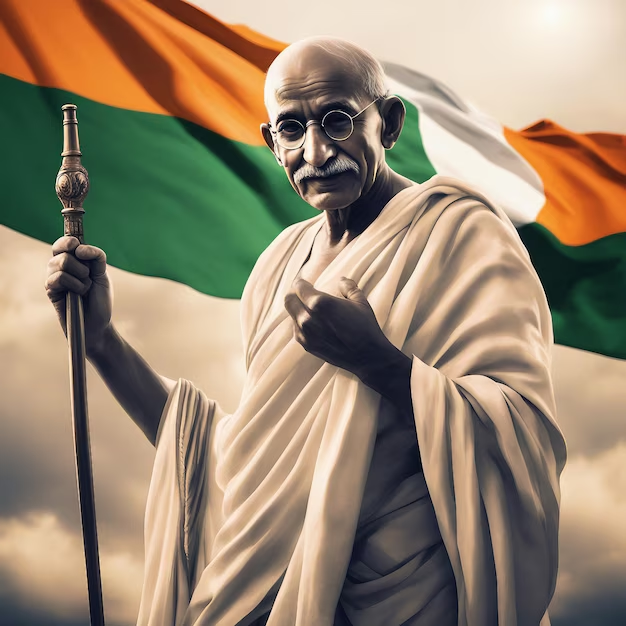
Mahatma Gandhi: The Beacon of Nonviolence and Social Justice
Mahatma Gandhi, born on October 2, 1869, in Porbandar, India, is celebrated as one of the most influential leaders in the history of the Indian independence movement. His philosophy of nonviolence and civil disobedience not only galvanized the Indian populace against British colonial rule but also inspired global movements for civil rights and freedom. Gandhi’s life and teachings continue to resonate, making him a symbol of peace and social justice worldwide.
Early Lifestyle and Education
Gandhi was born into a moderately affluent family, where he received a traditional upbringing. His early education took place in Porbandar, followed by a stint in London, where he studied law. It was during his time in England that he encountered a diverse array of ideas, including those of prominent thinkers like Henry David Thoreau and Leo Tolstoy. These influences laid the groundwork for his future philosophy, emphasizing truth, nonviolence, and moral integrity.
In 1893, Gandhi traveled to South Africa to work as a lawyer, where he faced racial discrimination firsthand. The injustices he experienced galvanized him into action, leading to the formation of the Natal Indian Congress and his advocacy for the rights of Indian immigrants. It was in South Africa that Gandhi developed his concept of Satyagraha, or “truth force,” a nonviolent method of protest against oppression.
The Return to India and the Independence Movement
In 1915, Gandhi returned to India, where the struggle for independence was gaining momentum. He quickly became a prominent leader in the Indian National Congress, advocating for nonviolent resistance against British rule. His approach attracted a diverse following, from peasants and farmers to intellectuals and women. Gandhi’s ability to connect with the masses through simple, relatable language and his emphasis on self-reliance resonated deeply with the Indian populace.
Gandhi led numerous campaigns against British policies, including the non-cooperation movement in 1920 and the Salt March in 1930. The Salt March, a 240-mile journey to the Arabian Sea to protest the British salt tax, became a pivotal event in the independence struggle. It was not just a protest against a tax; it symbolized the broader struggle against oppression and colonial exploitation. The images of Gandhi and his followers making salt became iconic, showcasing the power of peaceful resistance.
Philosopher of Non-Violence
At the heart of Gandhi’s philosophy was the principle of Ahimsa, or nonviolence. He believed that nonviolent action was the most potent weapon against injustice. Gandhi’s approach was rooted in the idea that violence begets violence, while nonviolence could lead to reconciliation and healing. This belief was not merely strategic; it was a moral imperative. For Gandhi, the means of struggle were as important as the end goal.
Gandhi’s commitment to nonviolence extended beyond political struggles; it encompassed social issues, including caste discrimination and poverty. He advocated for the upliftment of marginalized communities, particularly the Dalits, whom he referred to as “Harijans” or “children of God.” His efforts to eradicate untouchability were groundbreaking, emphasizing the need for social reform alongside political freedom.
Legacy and Global Influence
Gandhi’s influence extended far beyond India. His philosophy of nonviolent resistance inspired numerous leaders and movements worldwide. Martin Luther King Jr. drew from Gandhi’s teachings in his struggle for civil rights in the United States, while Nelson Mandela embraced nonviolent resistance in his fight against apartheid in South Africa. Gandhi’s methods and ideals continue to serve as a blueprint for those seeking justice and equality in various contexts.
Despite his remarkable contributions, Gandhi’s legacy is not without controversy. Some critics argue that his views on caste and gender were outdated and that his methods were sometimes impractical in the face of violent oppression. Nevertheless, his unwavering commitment to nonviolence and social justice remains a powerful testament to the potential of peaceful resistance.
Inspiration that Indians can Learn from Him
Mahatma Gandhi’s life and philosophy continue to inspire countless individuals and movements striving for justice and equality. His vision of a world where truth and nonviolence prevail is as relevant today as it was during his lifetime. As we reflect on his teachings, it is essential to remember that the struggle for justice is ongoing, and the principles of nonviolence, compassion, and understanding must guide our actions. Gandhi’s legacy is a reminder that real change begins within each of us, urging us to embody the values of peace and justice in our everyday lives.
